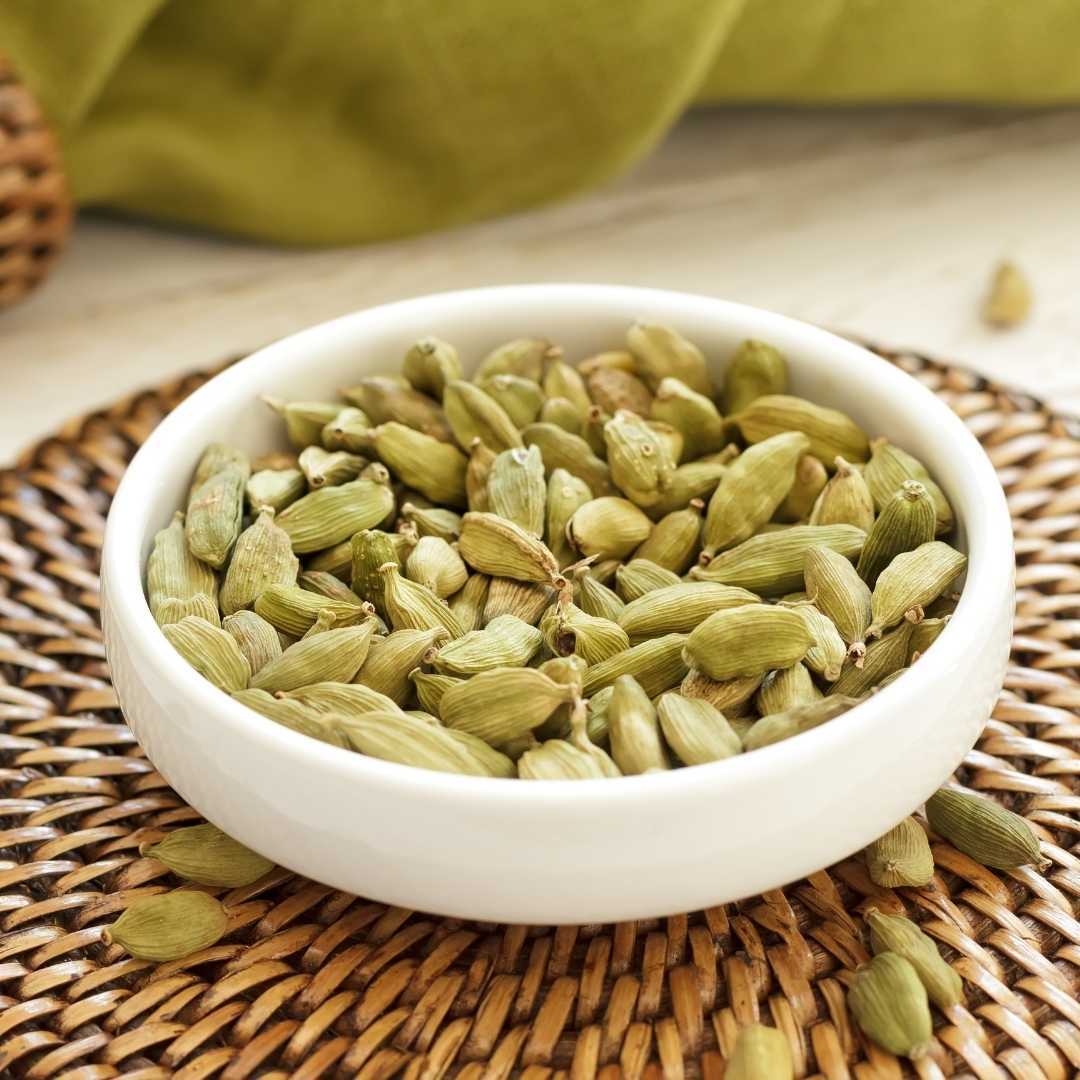
Cardamom is a spice from the ginger family (Zingiberaceae) that is distinguished by trigonal pod husks containing small black seeds. While cardamom is native to subtropical Asia and is a popular ingredient in Indian cuisine, it is also grown in Guatemala, Malaysia, and Tanzania. It can be purchased in whole pods, shelled whole seeds, or powdered form. It is also used in the production of soaps, creams, and perfumes.
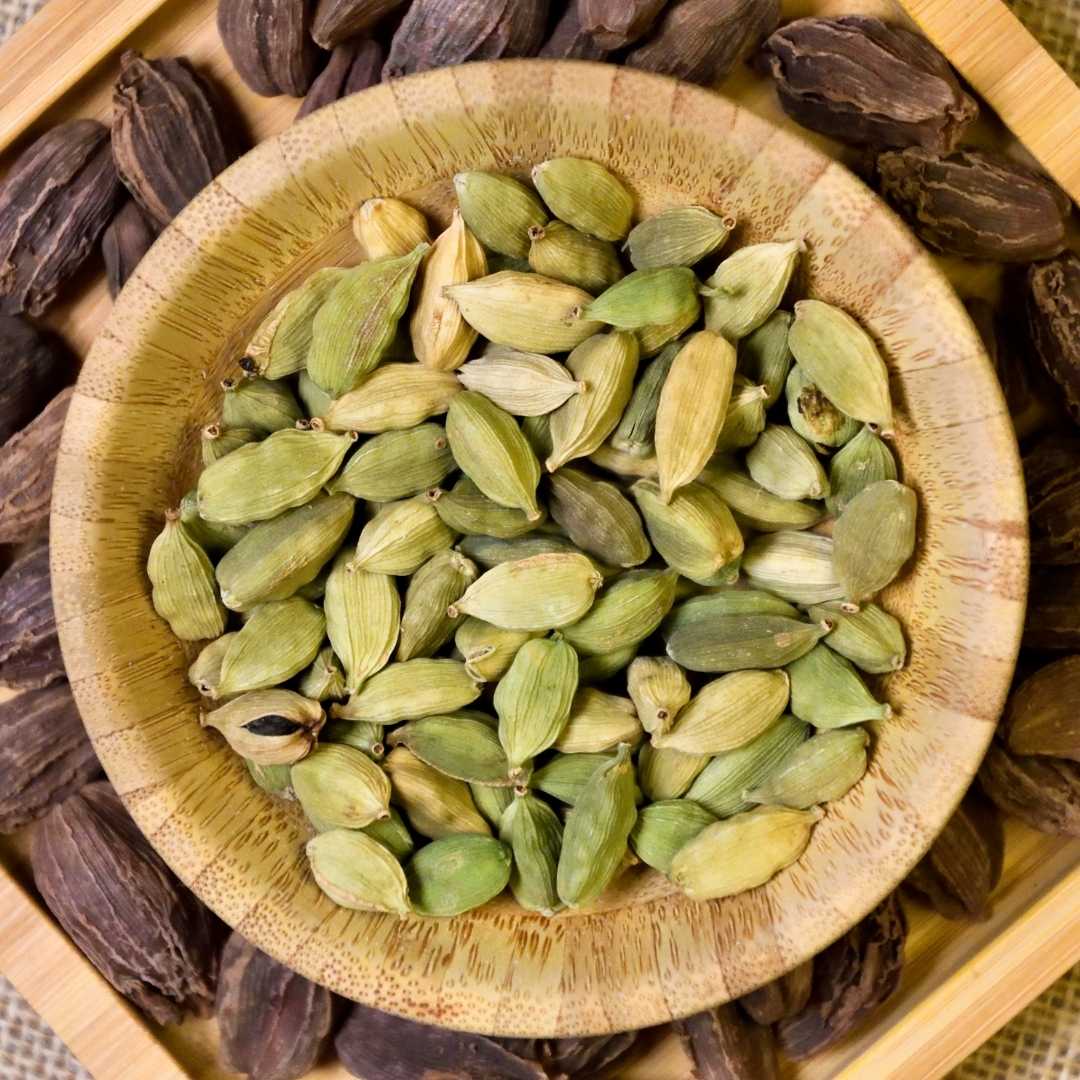
Cardamom is one of the most expensive spices by weight (only saffron and vanilla are more expensive), and it comes in two varieties: green cardamom and black cardamom.
- Green Cardamom - The green pods, elettaria cardamomum, also known as "true cardamom," have the most well-known cardamom flavor: a herbal warmth reminiscent of a fragrant cross between eucalyptus, mint, and pepper—more citrusy than fennel and sweeter than cumin.
- Black cardamom - It is duskier brown pods, mimics and dials down the flavor profile of green cardamom pods, with a hint of bark and smoke added.
Whole cardamom pods contain whole clumps of hard, crunchy cardamom seeds that are typically crushed in a mortar and pestle to separate them from the outer skin. While some recipes call for single seeds, such as rice dishes or pastries, the entire crushed seed pod can be added to a pot of chai to impart its full flavor before being strained out with the rest of the loose tea and other spices.
Cardamom powder is made from dried and ground cardamom seeds; cardamom powders that include the whole pods in the grind are usually of lower quality. Because the majority of cardamom's fragrant essential oils are found in the seeds, they lose potency fairly quickly once ground, so use it as soon as possible after purchase.
Cardamom is featured in both garam masala and masala chai—two customizable spice blends that play an invaluable day-to-day role in Indian kitchens—but it also appears in Moroccan seven-spice blends, some Thai curry pastes, Lebanese baharat, and Turkish coffee because it gets along with cinnamon and clove.
Both types of cardamom are used in savory and sweet dishes ranging from the Middle East to Scandinavia.
- Sweet – What goes well with cardamom? Add a teaspoon or two of cardamom to your next spiced fruit filling to add character and cut through any heavy sweetness, whether it's an apple pie or a stone fruit galette. Swedish kardemmummbullar and Finnish pulla are both baked goods studded with cardamom seeds that crunch and release a warm, spiced clarity onto the palate.
- Savory – Cardamom seeds, like cumin, are aromatically sprinkled throughout warm basmati rice and added to most curries in the form of garam masala. In Korea, cardamom is combined with unripe plums and sandalwood to make jeho-tang tea. It's an unusual addition to marinades, especially for lamb.
While cardamom is commonly used as a breath freshener and digestive aid in both Chinese and Ayurvedic medicine, its high magnesium content has been shown to help lower blood pressure and manage blood sugar.
Cardamom has been the subject of several small studies, the results of which indicate that it may have some health benefits. Although these studies are encouraging, large and well-controlled human studies are required before healthcare professionals can recommend cardamom for medical problems. Some of the health benefits are as follows:
Cardamom has been linked to improved heart health in animal studies, but more research is needed before researchers can determine how the spice affects human heart health. According to the results of a rat study, cardamom may help protect against heart attacks. It is speculated that its antioxidant properties may help improve heart function, but they emphasize the importance of human studies to confirm these findings.
Another study in rats discovered that cardamom oil could help improve cholesterol levels. For eight weeks, the researchers fed rats a high cholesterol diet. At the end of the study, the rats given cardamom had significantly lower cholesterol and triglyceride levels.
While many people associate mint and cinnamon with breath fresheners, cardamom has been used for centuries. They did so for more than just the flavor. Cardamom may aid in the fight against bacteria in the mouth, which is a common cause of bad breath, cavities, and gum disease.
A recent study discovered that due to their anti-inflammatory and antioxidant properties, cardamom seeds and fruit could help improve oral health. The results demonstrated that cardamom extract was effective at disrupting bacteria that can cause gum disease or infections.
Researchers asked participants in a randomized trial to chew either fennel or cardamom seeds for 5 minutes. Chewing either type of seed was effective in balancing the pH in the mouth, which may help prevent the development of cavities, according to the researchers.
Cardamom is used in Ayurvedic medicine for its detoxifying properties. Although there is no scientific evidence to support this claim, cardamom appears to have some beneficial effects on the liver, which is important in removing toxins from the body.
One study included people who were overweight or obese and had nonalcoholic fatty liver disease. When compared to those who took a placebo, those who took green cardamom supplements had improvements in liver health markers.
In another study, scientists fed rats a high fat, high carbohydrate diet and measured certain liver health markers in another animal. After 8 weeks, rats given cardamom had lower levels of liver stress than rats fed an unsupplemented diet. This discovery implies that cardamom may help protect the liver from certain types of damage.
Cardamom contains natural phytochemicals that may be useful in the treatment of diseases such as cancer. Although it cannot replace cancer treatment, some studies suggest that the spice may have cancer-fighting properties.
One study discovered that giving mice cardamom supplements for 15 days reduced the size and weight of their skin tumors.
Cardamom, like its cousin ginger, may help with digestive issues. Some people make stomach-soothing tea with the spice. It may also be beneficial in preventing stomach ulcers.
In a recent study, researchers used high doses of aspirin to induce stomach ulcers in rats. They then gave cardamom extract to some of the rats to see how it affected their ulcers. Cardamom extract fed to rats resulted in smaller and fewer ulcers than control rats.
Yet another study, similar results were obtained. Cardamom extract, when combined with turmeric and sembung leaf, was found to help protect rats from stomach ulcers. Some rats were given aspirin alone, while others were given the herbal extract first, followed by aspirin. The rats who received the extract had fewer and smaller ulcers than the rats who did not.
There have been no reported risks or adverse side effects from using cardamom in cooking. Most people can safely consume cardamom as a spice and flavoring agent. There is no standard dosage for supplementing with cardamom. Cardamom capsules or tablets typically contain 400-500 mg of dried herb per pill. A person should consult a healthcare professional before taking cardamom pills or any other natural supplements.
Although many of its health benefits require further research, most people can consume cardamom in moderate amounts.
Natural phytochemicals in cardamom have antioxidant and anti-inflammatory properties that may benefit health. However, it is too early to tell whether this spice can be used to treat any medical conditions.
Amchur Restaurant & Bar is one of the popular Indian restaurants which provides not only Indian cuisines but also Nepalese and Oriental cuisines with a contemporary approach which are not only healthy but also immensely delicious to the customers who have visited and dined at the restaurant. Amchur Restaurant & Bar provides dine-in service along with takeaway and delivery service. If you like to try out the takeaway or delivery you can place an order by clicking here. You can also reserve a table for your family or friends by clicking here.
-
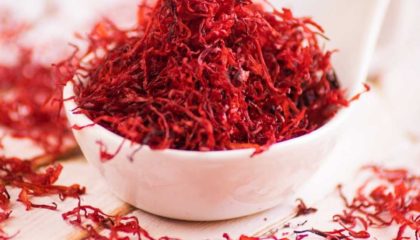 Read more +
August 1, 2022 By Amchur Restaurant in Spices
Read more +
August 1, 2022 By Amchur Restaurant in Spices
What is Saffron and its benefits?
-
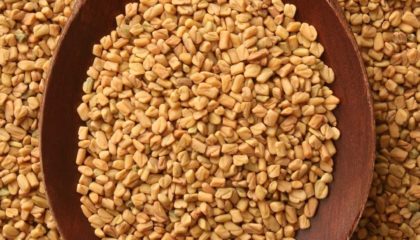 Read more +
July 25, 2022 By Amchur Restaurant in Spices
Read more +
July 25, 2022 By Amchur Restaurant in Spices
What are Fenugreek and its benefits?
-
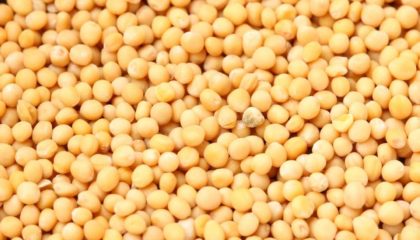 Read more +
July 21, 2022 By Amchur Restaurant in Spices
Read more +
July 21, 2022 By Amchur Restaurant in Spices
What are Mustard seeds and their benefits?
-
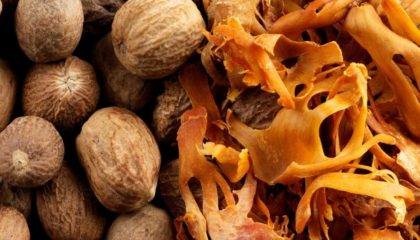 Read more +
July 18, 2022 By Amchur Restaurant in Spices
Read more +
July 18, 2022 By Amchur Restaurant in Spices
What are Nutmeg & Mace and its benefits?
-
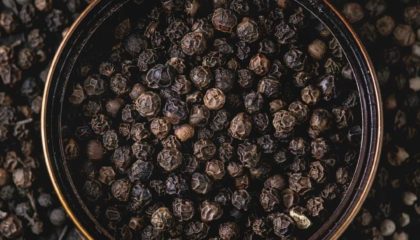 Read more +
July 14, 2022 By Amchur Restaurant in Spices
Read more +
July 14, 2022 By Amchur Restaurant in Spices
What are black pepper and its benefits?
-
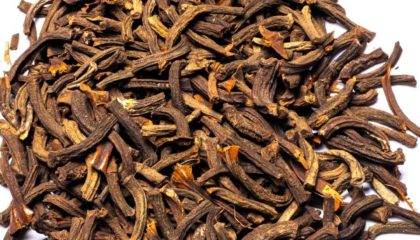 Read more +
July 11, 2022 By Amchur Restaurant in Spices
Read more +
July 11, 2022 By Amchur Restaurant in Spices
What are Cassia bark and its benefits?
-
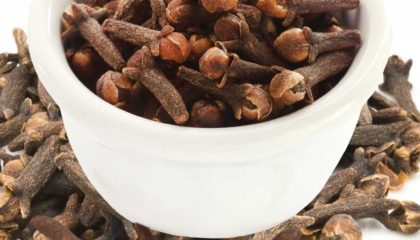 Read more +
July 7, 2022 By Amchur Restaurant in Spices
Read more +
July 7, 2022 By Amchur Restaurant in Spices
What are Clove and its benefits?
-
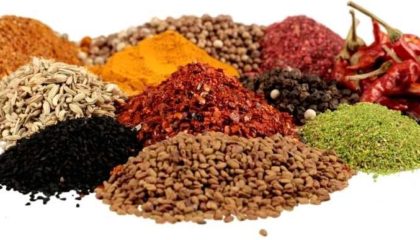 Read more +
June 30, 2022 By Amchur Restaurant in Spices
Read more +
June 30, 2022 By Amchur Restaurant in Spices
Essential Spices Used in Indian Restaurants
-
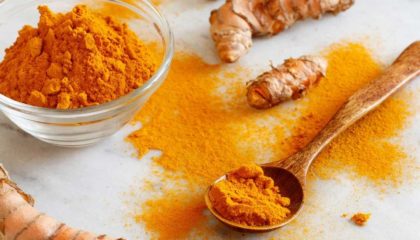 Read more +
June 27, 2022 By Amchur Restaurant in Spices
Read more +
June 27, 2022 By Amchur Restaurant in Spices
What is Turmeric and its benefits?
-
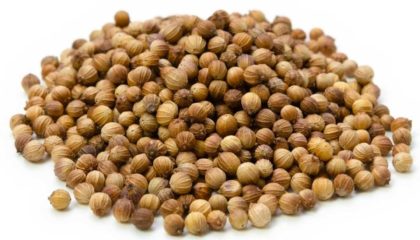 Read more +
June 24, 2022 By Amchur Restaurant in Spices
Read more +
June 24, 2022 By Amchur Restaurant in Spices
What Is Coriander and its benefits?

You must be logged in to post a comment.